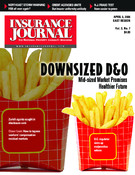Independent agents for Zurich Insurance are being asked to pay for the sins of company executives and large brokers accused of price fixing, account steering and misuse of finite reinsurance.
Even though Main Street independent agents had nothing to do with the illegal and unethical behaviors that led to various state lawsuits against Zurich, Main Street agents are being caught up in the crackdown. Under the terms of two class action settlements with a combined 13 states, all Zurich agents must now reveal their income before binding any commercial policy on behalf of Zurich. If it’s an excess casualty policy, they can kiss any contingent compensation good-bye. In this, they are in company with agents of AIG, which signed a similar deal in February that restricts contingencies.
Even though not all states are involved, Zurich is applying the disclosure requirements in the settlements nationwide. The company doesn’t appear to have much choice.
But now Zurich agents don’t have much choice either. Zurich independent agents will have to disclose their income even though their competitors may not.
The company is trying to put the best spin on the disclosure deal. In a letter to its agents and brokers, Craig Fundum, chief marketing officer, wrote:
“Our willingness to enter into these agreements is based firmly on our conviction that the commission process is fair and reasonable, especially considering the complexity of the business you place, the breadth of the services you provide, and your professionalism and expertise. Given these factors, there should be no reluctance on our part to share this type of information with customers. This will be another step toward demystifying the insurance-buying process.”
But it’s only a partial demystification; it doesn’t feel right. Of the 10 states that have signed on to the Zurich requirement for pre-binding disclosure of agent compensation, two (Oregon and Texas) have officially adopted similar producer disclosure regulations. The other states have rejected or not yet decided whether to impose disclosure rules on agents. Yet, as a result of these class action deals with a handful of states, Zurich agents in all states will have to disclose, even as agents for other carriers (and captive agents for Zurich) against whom they compete do not.
It appears that state regulators, perhaps unwittingly, have discovered a way to implement the disclosure terms advocated by the National Association of Insurance Commissioners without going through the usual legislative or regulatory channels. If the Zurich settlement becomes a framework for future settlements with other companies that have been sued, the NAIC model disclosure could be implemented more through the courts than through state legislative or regulatory procedures.
Regulation by class action invites a mishmash of rules of disclosure– one set for insurers that have been sued and settled and then separate rules for what every other company chooses to do. Transparency should foster a policyholder’s ability to comprehend and compare. A proliferation of disclosure rules is likely to confuse customers and eventually burden independent agents if it goes unchecked.
It could very well be that open disclosure will end up being a competitive advantage for Zurich agents and others who practice it. We suspect it already may be a winning strategy with many customers. But in the end, everyone is better served by more uniformity in what is disclosed.
Was this article valuable?
Here are more articles you may enjoy.


 Lawyer for Prominent Texas Law Firm Among Victims ID’d in Maine Plane Crash
Lawyer for Prominent Texas Law Firm Among Victims ID’d in Maine Plane Crash  What Analysts Are Saying About the 2026 P/C Insurance Market
What Analysts Are Saying About the 2026 P/C Insurance Market  Allstate Doubles Q4 Net Income While Auto Underwriting Income Triples
Allstate Doubles Q4 Net Income While Auto Underwriting Income Triples  Uber Jury Awards $8.5 Million Damages in Sexual Assault Case
Uber Jury Awards $8.5 Million Damages in Sexual Assault Case 


